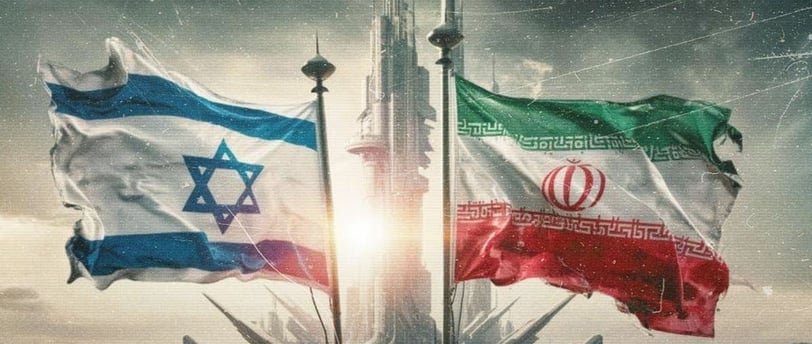Unprecedented Military Escalation: The Israeli-Iranian War Reaches a Dangerous Turning Point
Unprecedented military escalation between Israel and Iran sparks deadly strikes, diplomatic moves, and fears of full-scale regional war. Read a comprehensive 48-hour report.
REfaat Ibrahim
6/17/20253 min read


The Middle East is currently witnessing an unprecedented surge in tensions between Israel and Iran, culminating in one of the most perilous direct confrontations in recent decades. Over the past 48 hours, both nations have engaged in intensive military exchanges that have resulted in significant casualties, extensive injuries, and the destruction of critical infrastructure. This sharp escalation unfolds amid a complex web of military strategies, regional alliances, and international dynamics, raising growing concerns about the possibility of a full-scale war engulfing the region.
Israeli Strike: Assassination of the Iranian Military Commander and Destruction of Nuclear Facilities
On the morning of Tuesday, June 17, 2025, the Israeli Defense Forces announced the assassination of Ali Shadmani, Iran’s newly appointed Chief of War Staff and one of the most influential military commanders close to Supreme Leader Ali Khamenei. The operation was carried out via an airstrike targeting a key facility in the heart of Tehran. This bold move provoked furious responses from Tehran, which vowed to retaliate with “severe strikes.”
In addition to this high-profile assassination, Israel intensified its attacks on Iranian nuclear infrastructure, targeting sites in Natanz and Isfahan, two critical hubs for uranium enrichment. The strikes caused substantial damage to these facilities, though the International Atomic Energy Agency confirmed that radiation levels remained within normal limits. Nevertheless, the attacks have sparked widespread fears of a potential radioactive leak that could imperil civilian populations and the environment.
Iranian Response: Waves of Ballistic Missiles and Advanced Suicide Drones
In retaliation, Iran launched its ninth wave of ballistic missile strikes, targeting vital areas within Israel, including Tel Aviv, Haifa, and Be’er Sheva. Israeli reports estimate that between 20 and 30 missiles were fired, some of which penetrated Israel’s air defense systems and struck an eight-story residential building in Herzliya. This attack injured 15 civilians and forced the evacuation of hundreds.
Moreover, the Iranian Revolutionary Guard Corps announced the deployment of advanced suicide drones targeting Israeli military centers, including the headquarters of “Aman” (military intelligence) and the Mossad operations planning center. Iranian commanders have emphasized that they have yet to exhaust their missile arsenal, leaving open the possibility of further escalation.
Human and Material Losses: Rising Numbers and Humanitarian Crises
The ongoing clashes have caused dozens of casualties and widespread destruction on both sides.
In Iran, local sources reported the deaths of 21 individuals in Lorestan Province due to Israeli airstrikes, alongside the destruction of three Israeli drones. The city of Tabriz experienced powerful explosions following strikes on its industrial zone.
In Israel, emergency services confirmed five direct injuries from missile attacks, with an additional ten injured while fleeing to shelters. More than 1,600 civilians were evacuated from Haifa and Tel Aviv after their homes were destroyed.
Furthermore, the Weizmann Institute laboratories in Rehovot suffered severe damage after being hit by an Iranian missile, leading to the loss of decades of scientific research and breakthroughs.
Regional and International Implications: Frantic Diplomatic Moves
As the military confrontation intensifies, the international community has mobilized diplomatic efforts to contain the crisis:
1. United States: President Donald Trump cut short his attendance at the G7 summit in response to the Middle East developments, urging Tehran’s residents to “evacuate immediately,” signaling possible forthcoming U.S. military actions. The White House also revealed ongoing discussions with Iran aimed at arranging an emergency meeting between the U.S. envoy and the Iranian foreign minister to negotiate a ceasefire.
2. Russia: The Kremlin expressed its readiness to mediate, keeping the proposal of storing Iranian uranium on Russian soil on the negotiating table. However, the European Union questioned Moscow’s neutrality due to its military cooperation with Tehran.
3. United Nations: The UN Secretary-General called for an immediate ceasefire, warning of catastrophic humanitarian consequences if the conflict persists. UNICEF echoed this concern, emphasizing that children are bearing the heaviest toll in this war.
Strategies of the Two Sides: Divergent Objectives and Grave Risks
Israel’s goal: to enforce new deterrence equations by crippling Iran’s nuclear program and weakening Tehran’s military capabilities. However, Israel faces the challenge of achieving these objectives without dragging Washington into a broader war.
Iran’s aim: to demonstrate its ability to directly retaliate against Israel while maintaining open diplomatic channels. The Iranian Foreign Ministry reiterated that “diplomacy does not cease even amid war.”
Future Scenarios: Between Total War and De-escalation
With the escalation continuing, three primary scenarios emerge:
1. Full-Scale Escalation: If retaliatory strikes persist, the region could descend into a wider regional conflict involving allied groups such as Hezbollah in Lebanon and Iran-backed militias in Iraq and Syria.
2. International Mediation: Increasing pressure from the U.S. and European powers might lead to a temporary ceasefire, especially amid fears of a global energy crisis due to disrupted oil supplies.
3. War of Attrition: Should neither side secure a decisive military victory, the conflict may evolve into a prolonged struggle, draining the human and economic resources of both parties.
The Region on the Brink
The Middle East now stands at a critical crossroads, with military escalation threatening to ignite a devastating war with unforeseeable consequences. While international powers strive to manage the crisis diplomatically, the pressing question remains: will diplomacy prevail in restraining the conflict, or is the region heading towards a new chapter of violence?
Sources: Al Jazeera, Al-Araby Al-Jadeed, United Nations, and Iranian and Israeli media outlets.
Awareness
Documenting reality, amplifying Palestinian voices, raising awareness.
Contact Us:
resistant.p.pens@gmail.com
Follow our social media
